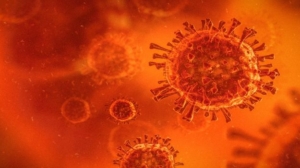U.S. Officials Rush to Reassure as Mu Variant Grabs International Headlines
U.S. Officials Rush to Reassure as Mu Variant Grabs International Headlines
As cases of the Delta variant continue to raise concerns across the U.S., a new variant reaches a warning level for the World Health Organization.
The new coronavirus variant ‘Mu’ showed signs of possible resistance to vaccines, with the global health body designating it as a ‘variant of interest’ and said it is monitoring it closely.
The Mu variation is the fifth strain of the SARS-CoV-2 virus to be designated as a “variant of interest” by the World Health Organization. It is the latest variant to spark concern since the more contagious Delta variant, which has led to a fourth outbreak of the virus in the United States.
Dr. Anthony Fauci said at a press briefing on Thursday that the U.S. is closely monitoring the new coronavirus variant but that the strain doesn’t seem to pose an “immediate threat.”
Fauci told reporters that Mu is “not at all even close to being dominant” and that it is not as prominent as Delta, which he said has a 99% dominance.
More than 98% of current U.S. Covid cases are caused by the Delta variant, which is highly transmissible and driving infections, hospitalizations and deaths nationwide.
The Mu variant has grabbed international headlines. Because of the high number of mutations, the WHO said the new variation may be impervious to immunological defenses and may even transmit more quickly than other versions.
The variant possesses genomic alterations that suggest current vaccines or monoclonal antibody treatments may not be as effective against it as they are against the original virus.
The UN agency clarified that more research is required to confirm whether the Mu variant will prove to be more infectious, lethal or vaccine-resistant.
Preliminary data demonstrates behavior parallels between Mu and the Beta variant when the latter first emerged in South Africa.
Fauci noted that the Mu variant can bypass certain antibodies produced by the vaccine, but added that there is no meaningful clinical data to show that it altogether eliminates the vaccine.
Also known as B.1.621, the Mu variant was first identified in Colombia in January 2021 and has since been confirmed in at least 39 countries. There have been sporadic reports of cases and some larger outbreaks in South America and Europe, the WHO said in its weekly bulletin on the pandemic.
Although global prevalence of the variant is currently below 0.1%, the Mu variant’s prevalence in Colombia and Ecuador has consistently increased, where it accounts for approximately 39% and 13% of respective cases.
Reports on the variant’s prevalence should be “interpreted with due consideration” given the low sequencing capacity of most countries, the agency said.
According to the Centers for Disease Control and Prevention (CDC), the Mu variant is nowhere near as widespread in the United States as other Covid-19 strains.
Mu currently accounts for 0.2% of total cases in the United States. The only variant that represents more than 0.3% of the cases circulating in the country is the Delta variant, which represents 99.1% of all cases.
Per the GISAID open-source genome repository, more than 4,500 sequences (3,794 B.1.621 sequences and 856 B.1.621.1 sequences), genome sequences, and analyzed samples of the virus which were taken from patients were designated as Mu during the past 4 weeks.
But Mu is not the only new variant that has attracted attention. Recently, according to a new pre-printed study by the South African National Institute of Communicable Diseases, scientists discovered another variant in South Africa and some other countries, called C.1.2, fearing it could be more infectious and adept at avoiding the vaccine.
While first detected in South Africa, C.1.2 has since been found in England, China, the Democratic Republic of the Congo, Mauritius, New Zealand, Portugal, and Switzerland.
While Alpha, Beta, Gamma and Delta are currently four variants labeled ‘variants of concern’ by the CDC and the WHO in the U.S. and around the globe, there are also several ‘variants of interest’ like Eta, Iota, Kappa, Lambda and, most recently Mu.
BioSpace source:




